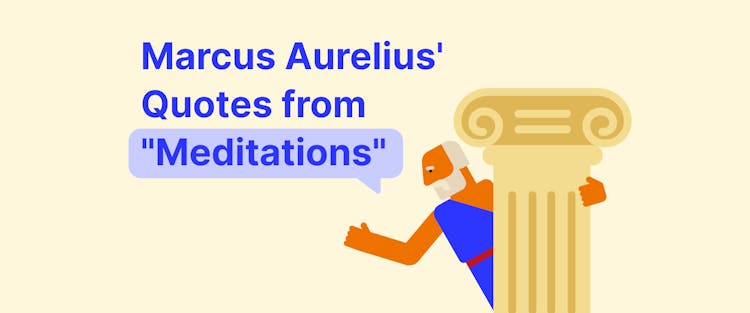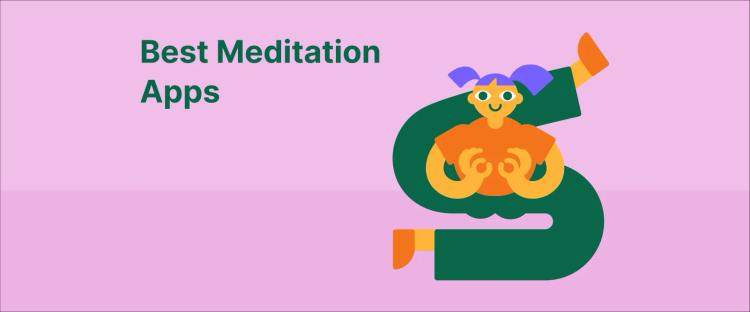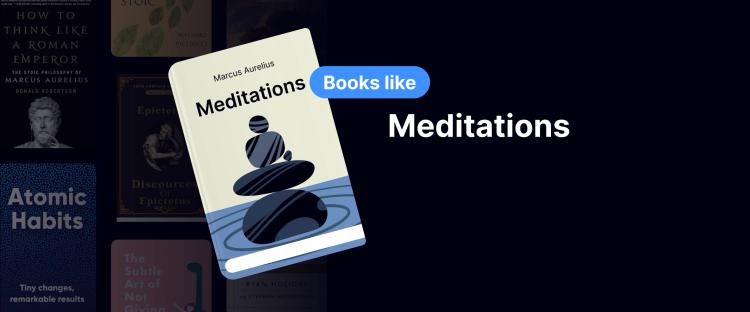Struggling to fall asleep every night? If you're among the 35% and 50% of adults worldwide who struggle with insomnia regularly, you know how deeply sleep problems can affect your well-being. In such cases, meditation is a fantastic technique for easing insomnia symptoms, as it helps you relax your body and mind while fostering inner peace.
In this article, you'll find insights into starting meditation and reaching restful sleep from the famous books 'The Power of Now,' 'Why We Meditate,' and 'Wherever You Go, and There You Are.'
Ready to put these techniques into practice? Download the Headway app to explore guided meditations and book summaries that make winding down at night easier than ever.
Can you meditate while in bed?
Yes, regular meditation helps you fall asleep faster and sleep deeper. Studies have shown that meditation promotes the growth of gray matter in areas of the brain associated with emotional control and self-awareness. Bed meditations are special breathing, physical practices that help relieve tension from the body and help calm the mind. So, most people naturally fall asleep during meditation sessions. Sleep meditation is designed to consider the frequencies of waves contributing to deep and restful rest.
For beginners and experienced meditators, approaches can vary in depth and complexity. Beginners should start with simple practices focusing on breathing and calming down, while experienced practitioners can venture into more complex techniques. However, the common goal of all practices is to achieve a state of calm and relaxation.

Scientific insights reveal how meditation enhances sleep quality
John Dudley from the University of South Florida reports that meditation and restful nights are closely interconnected due to their effect on neurophysiological processes in the brain and nervous system. Meditation improves sleep because it helps reduce stress levels and balance the nervous system's activity, making it easier to fall asleep, which promotes deeper and more restful sleep.
During meditation, your body should naturally lower cortisol production — the primary stress hormone. Simply, the lower the cortisol level, the easier it is to fall asleep and enjoy a deep sleep. Meditation also affects the area of the brain responsible for processing emotions, particularly fear and anxiety, reducing its reactivity. According to the National Institute of Health, this helps reduce anxiety levels, which directly affects sleep quality.
From a mental perspective, meditation before bed improves the quality of mental activity, strengthening cognitive functions and promoting better concentration. Achieving this is especially important for those requiring increased productivity and creative thinking.
The mental benefits of meditation are just the beginning; its impact extends to various areas of well-being, offering a range of physical and emotional advantages.

Here are some of the most significant benefits:
Improves mood and ability to concentrate
Promotes cognition and overall mental health
Lowers blood pressure and improves heart health
Reduces inflammation and enhances pain response
Preparing for bedtime meditation
To meditate effectively, you must create a distraction-free sacred space for connecting with the collective unconscious. Achieving this state can be arduous for those in bustling cities, so learning to tune out external noise and distractions is a must. Ultimately, the quietest place for meditation is within yourself. Choosing this internal space will help you develop a new meditation routine and strengthen your neural connections.

"Be at least as interested in what goes on inside you as what happens outside. If you get the inside right, the outside will fall into place." – Eckhart Tolle, 'The Power of Now'
Evening time is often associated with rest. In this context, meditation before bed can be a part of your sleep hygiene for achieving long-awaited peace. Freeing the mind from many thoughts and worries opens the way to deep and restorative sleep, establishing healthier habits and deepening self-awareness.
Preparing for meditation is the first step toward self-knowledge, where every element, from your inner state to your surroundings, plays a role in creating a favorable space for evening relaxation. Finally, aim to meditate at the same time every day to create a bedtime routine that will signal the body when it is time to rest.

What are some effective meditation techniques to practice in bed before sleeping?
Mindfulness, progressive relaxation, breathing exercises — the choice of meditation methods before bed is wide and varied. Each one aims to help you clear your mind from the bustle of the day, find inner peace, and prepare for a good night's sleep. Regardless of your experience in meditation, among the proposed types of meditation, you will find one that suits your individual needs and preferences.

Progressive muscle relaxation is an effective technique developed by American scientist and physician Edmund Jacobson in the 1920s. The method relies on a simple physiological fact: any muscle automatically relaxes deeply after intense tension.
"An anxious mind cannot exist in a relaxed body…" – Edmund Jacobson
How to do it:
This technique involves engaging and consistently working with different parts of the body. First, you focus on a specific muscle group, tensing them for a few seconds, and then consciously relax, paying attention to the change in sensations. Repeat this procedure for different muscle groups throughout the body.
Progressive relaxation is beneficial before bed. It helps to calm down after daytime worries, release accumulated stress and tension, and prepare the body for quality rest.
Guided Meditation
In this technique, another person guides you through each stage, helping you relax your body or visualize specific images. It can be a voice from a podcast, a meditation app, or a recording from a music platform.

How to do it:
Choose an audio recording for meditation, dim the lights in the room, lie down on your bed, take deep breaths, and exhale.
Focus on the voice, following its instructions, but if your attention wanders, return to the voice. This technique promotes deep relaxation before bed.
Body scan meditation
The body scan is a meditation that lets you focus on each part of your body, feeling its condition and tension. This technique creates a feeling of deep relaxation, which helps you fall asleep faster.
How to do it:
Lie in a comfortable position and eliminate factors that irritate you.
Start by breathing deeply and feeling how your whole body touches the bed. Focus on your face, relax your muscles, and then move on to your neck, shoulders, and other body parts.
Focus on different parts of your body, gradually moving to your toes. If your attention wanders, focus on your body again.
📘 Relax deeply with Headway.
Breathing exercises
"Follow the breath with your attention as it moves in and out of your body. Breathe into the body, and feel your abdomen expanding and contracting slightly with each inhalation and exhalation. If you find it easy to visualize, close your eyes and see yourself surrounded by light or immersed in a luminous substance—a sea of consciousness. Then breathe in that light. Feel that luminous substance filling up your body and making it luminous also. Then gradually focus more on the feeling. You are now in your body. Don't get attached to any visual image." – Eckhart Tolle, 'The Power of Now'
Breathing techniques physiologically calm the nervous system, promoting deep relaxation. Start with breathing practices before bedtime. Simple deep breath control can quickly help balance the nervous system. For example, the 4-7-8 technique is one of the most effective: inhale for 4 seconds, hold your breath for 7 seconds, and exhale for 8 seconds. This rhythm helps reduce anxiety and sets the brain to rest.

Focusing on your breathing before bed promotes relaxation, helps you fall asleep faster, and eases you into deep sleep. Mindful breathwork can bridge your waking state and the dream world, where your body and mind are restored and ready for the day ahead.
Mindfulness practice
Mindfulness training consists of constantly returning to the present moment, concentrating on what is happening in your thoughts or around you. Try this technique.
How to do it:
Find a comfortable place to practice where you are quiet and still. Set a time limit. If you are just starting, choose 5 or 10 minutes. Pay attention to the sensations in your body. Feel your breath. Pay as much attention to inhalation and exhalation as you can. Notice when your mind starts to wander. Your attention will inevitably shift focus from the sensations of your breath to thoughts, emotions, or other sensations. Be kind to your wandering brain. Don't judge yourself or dwell on the content of the thoughts you have lost. Gently return to your breath. When you are ready, bring your attention to the sounds around you, outside or inside. It may help you manage stress and be more resilient to it.
"Unease, anxiety, tension, stress, worry — all forms of fear — are caused by too much future, and not enough presence. Guilt, regret, resentment, grievances, sadness, bitterness, and all forms of non-forgiveness are caused by too much past, and not enough presence." – Eckhart Tolle, 'The Power of Now'
If you pay attention to your body, you may notice that your jaw or hands are tense at the end of the day. Try to pay attention to such seemingly insignificant little things. It will allow you to listen to your body's needs for relaxation or sleep.
"Mindfulness practice means that we commit fully in each moment to be present; inviting ourselves to interface with this moment in full awareness, with the intention to embody as best we can an orientation of calmness, mindfulness, and equanimity right here and right now." ― Jon Kabat-Zinn, 'Wherever You Go, There You Are'
Focus on an object, image, breath, action, or music. This method of meditation helps you feel the "here and now" and reduces the burden of the flow of thoughts and emotions. The practice of observing thoughts and feelings is effective for reducing daily stress. Instead of fighting or thinking about unwanted or disturbing thoughts and emotions, try observing them. This method teaches you not to identify with your thoughts and worries.

Overcoming common challenge
Beginners often face challenges such as unrealistic expectations, inconsistency, and struggling to find a quiet space to practice amidst the chaos of daily life.
Internal dialogues in your head
"You can't stop the waves, but you can learn to surf." ― Jon Kabat-Zinn, 'Wherever You Go, There You Are'

Challenge yourself to tame your wandering mind! Our minds constantly wander, filled with thoughts that continuously replace one another. As a result, we struggle to concentrate on a single thing. Inside us, a spontaneous and largely uncontrolled internal dialogue unfolds. This process generates both pleasant and unpleasant sensations. Our minds frequently recall curious incidents and replay these memories repeatedly. Instead of experiencing these moments just once, as we would prefer, we revisit them dozens or even hundreds of times, reliving the same negative emotions.
Take control by writing it down. Putting thoughts on paper allows us to free ourselves from their burden in our heads. That is why most psychologists advise keeping a diary, where you write down everything that worries you. Ready to try? Grab a notebook and start jotting down what’s on your mind.

"The mind is a superb instrument if used rightly. Used wrongly, however, it becomes very destructive. To put it more accurately, it is not so much that you use your mind wrongly - you usually don't use it at all. It uses you." – Eckhart Tolle, 'The Power of Now'
2 Awaken your awareness
Explore the depths of mindfulness and take your practice beyond simple relaxation. You don't need to be upset that you can't concentrate. Whenever you notice that your mind has wandered, you have succeeded. Take this as an opportunity to guide yourself. Sit, breathe, and use your inner vision to scan your body from forehead to heel. By becoming aware of each muscle, you can focus on releasing and relaxing it. Are you ready to test your focus and unlock a deeper sense of awareness?

"Just watch this moment, without trying to change it at all. What is happening? What do you feel? What do you see? What do you hear?" ― Jon Kabat-Zinn, 'Wherever You Go, There You Are'
3 Don't have high expectations
Everyone has their own idea of meditation. Some think that when they start meditating, they will instantly feel incredible flows of energy, vibrations, and unique physical sensations. Meditation is not about expecting ecstasy; rather, it is about transforming the habitual patterns of the mind, which often fixates on the past or the future and reacts to everything—both good and bad. It's an opportunity to train your mind to react less, accept more, and find clarity in reality as it is—not as you wish it to be.

Find your calm tonight: Start your meditation journey with Headway
Incorporate bedtime meditation into your nightly routine to enjoy better sleep and peace of mind. Ready to dive deeper? Explore the Headway app for ideas and insights into mindfulness and meditation. Sweet dreams start here!

Pay attention to the following books from our library to deepen your knowledge in meditation and calming your mind and body before bed:
'Calm' by Fearne Cotton
'Stillness' Is the Key by Ryan Holiday
'10% Happier' by Dan Harris
'The Power of Now' by Eckhart Tolle
What is the Headway app? It is a handy book summary app. You can set your goals and allocate time to grow by listening to or reading self-help books.
Headway will offer you books that personally interest you. It is an excellent solution for quickly mastering much new valuable knowledge and getting practical insights daily. So why not give it a try to make sure?
📘 Master knowledge daily with Headway.
FAQs
Is it okay to meditate on bed?
Yes, meditating in bed is perfectly fine. It’s a convenient way to relax your body and calm your mind before bed. Your bed helps to support your body, and a regular bed meditation practice can help you fall asleep faster, improve your sleep quality, and reduce stress, making your evening routine more restful and beneficial.
Is 20 minutes of meditation equal to 4 hours of sleep?
No, 20 minutes of meditation is not the same as 4 hours of sleep. Meditation calms the mind and reduces stress, which improves feelings of rest, but it does not replace the physiological processes of sleep, such as the recovery of the brain and body. Real sleep remains essential for health and energy.
How to meditate in bed laying down?
Bed meditation is a simple way to relax before bed. Lie on your back or side in a comfortable position, arms relaxed at your sides or on your stomach. Close your eyes and focus on your breathing: inhale and exhale slowly, feeling your stomach rise and fall.
What are the 4 poses for meditation?
Four popular meditation positions are: sitting on the floor with your legs crossed, sitting in a chair with your back straight, lying on your back in bed or on your back on a relaxation mat, and standing with your shoulders relaxed. The choice depends on the comfort, purpose, and experience of the practitioner.
Is it OK to meditate with your eyes open?
Yes, it is perfectly normal to meditate with your eyes open. It helps you stay aware of your surroundings and practice mindfulness in your daily life. You can gently focus your eyes on a single point or gaze into the distance without straining your eyes to maintain calm and concentration.










